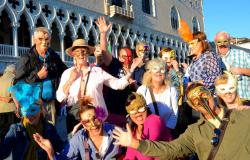They call it ‘the pearl of the Euganean Hills,’ and indeed Arquà Petrarca has fully preserved its medieval charm; no wonder that it is classified as one of Italy’s most beautiful villages; it has also been awarded the Bandiera arancione award (Orange Flag) for excellence in tourism, hospitality and the environment.
The name of Arquà derives from the Latin Arquatum ("Arched"), probably a reference to the hills that surround the village in an arc shape; it eventually became Arquà. In 1868, ‘Petrarca’ was added to the name to honor the poet who spent the last four years of his life there, attracted by a landscape and a peacefulness that reminded him of his native Tuscan lands.
Indeed, a good place to begin your visit of Arquà Petrarca is the piazza where the tomb of Petrarch, a red marble of Verona ark, has been standing since 1389, with a bust of the poet. Erected by Francescuolo da Bassano, Petrarch's son-in-law, it was modeled after Antenor's grave, located nearby in Padua. A few years ago, a carbon 14 test was carried out which revealed the presence of a female dna, so it is not certain that the remains are indeed those of Petrarch.
The picturesque alleys that lead to the upper part of the village are lined with medieval stone houses and buildings, erected by wealthy families from Venice and Padua, who used to meet at the Loggia dei Vicari to administer the area on behalf of La Serenissima, and at the 12th century Oratory of the Trinity.
Further up is Petrarch’s house, whose original structure dates back to the 13th century. Petrarch himself supervised the renovation of the building, splitting it into two areas, one for the servitude, the other for himself, with a beautiful view over the hills. Inside are several frescoed rooms, with scenes taken from the poet’s main works, commissioned by subsequent owners of the house. The study, complete with chair and bookcase, has been left as it was originally.
Make sure you stop by the stores selling typical local products, such as ‘brodo di giuggiole,’ a sweet liqueur made with jujube, an autumnal fruit, olive oil from the Euganean Hills, and the Moscato Fior D’Arancio, a spumante obtained from moscato grapes harvested in the surrounding hills.
Arquà Petrarca is 20 minutes from Padua and less than an hour from Venice by car. The nearest train station is Monselice.
For more information, visit the dedicated website.













